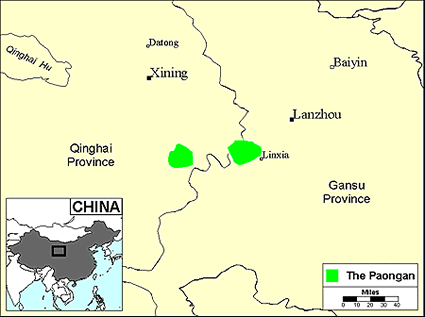During the Mongolian world empire, large numbers of people from Central Asia were mixed together and sent to China as troops and administrators. These garrisons settled after the collapse of the empire and gradually formed into their own people groups. The Bonan were originally Mongol troops sent to their present location on the edge of Chinese territory to act as watch guards against the fierce Tibetans. In 1862 religious friction between Muslim Bonan and those who had embraced Tibetan Buddhism caused the two groups to split. These religious disputes and a quarrel over water rights caused the Muslim Bonan to move east to their present location in Gansu.
After decades of intermarriage with other peoples such as the Hui, Han, and Tu, a distinct people group formed who came to call themselves Bonan, which means "I protect you." This name refers to their long history as the soldiers and protectors of the people in the area.
The Bonan speak a Mongol language, altered from their original Mongol tongue by 700 years of isolation. Today, Bonan is more similar to the Dongxiang and Tu languages than to modern Mongolian. A 1960 study of 3,000 words found that approximately half of the Bonan vocabulary were loanwords from other languages.
The Bonan are renowned for their famous Bonan knife. It is a skillfully made knife with engraved oxhorn handles. Profits from sales of the knife, along with farming and logging, are the main sources of income for the Bonan. The Bonan send the best of their young people to study at the Northwest Nationalities Institute in the city of Lanzhou.
The majority of Bonan are Sunni Muslims. They worship in their own mosques and no longer consider the Tibetan Buddhist Bonan to be their brothers. The Bonan are linguistically related to the Dongxiang Muslims in the area and live downstream from the Muslim Salar people of Xunhua. First converted to Islam by Muhammed Amin in 1750, Xunhua County contained 73 mosques in the early 1980s.
There has never been a Bonan church nor a single known Bonan believer. Missionaries worked among the neighboring Salar until the 1950s, but they were unable to establish a church. Little has changed since the 1920s when a plea went unheeded for workers to the Muslims in Gansu, "to give their whole time to each of these tribes."
The Bonan people need to submit to Jesus Christ so they can experience the abundant life he offers in John 10:10.
Pray for bold workers who are driven by the love of the Holy Spirit to go to them.
Pray for an unstoppable movement to Christ among them.
Pray for the authority of Christ to bind hindering spiritual forces to lead them from darkness to light.
Pray for signs and wonders to happen among them and for great breakthroughs with a rapid multiplication of disciples and house churches.
Scripture Prayers for the Bonan in China.
Operation China, Asia Harvest, Copyrighted © Used with permission
| Profile Source: Joshua Project |











